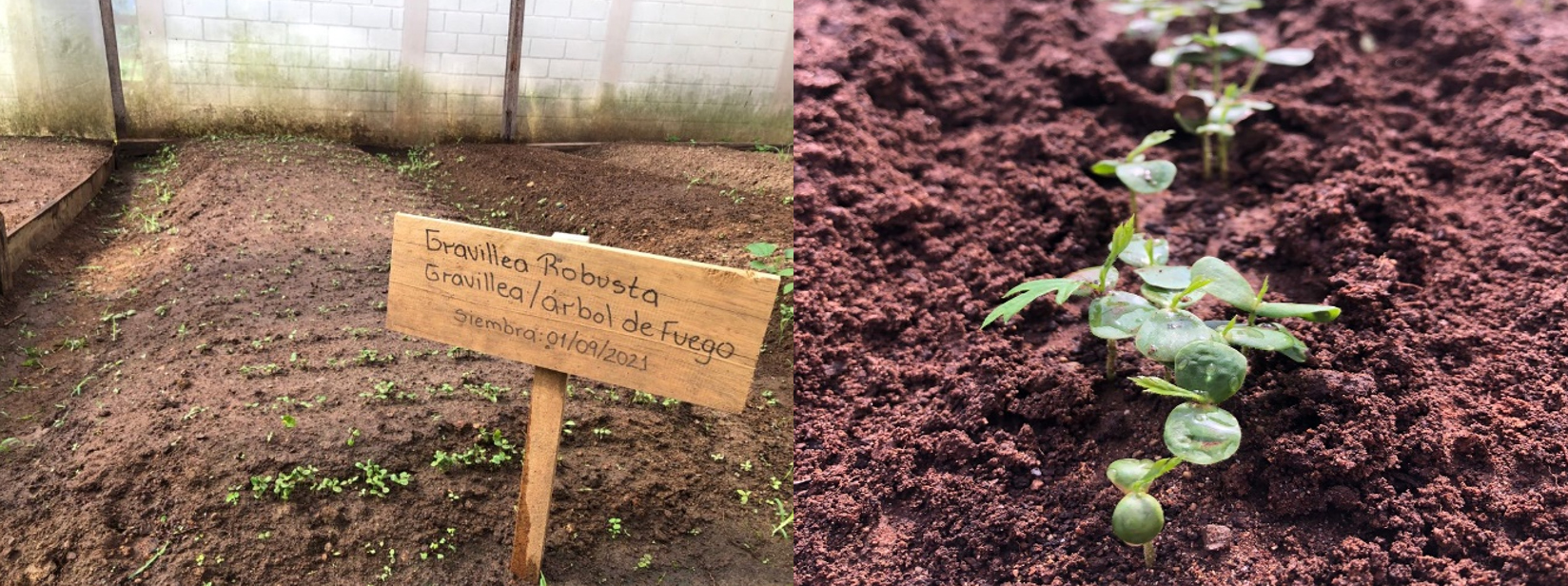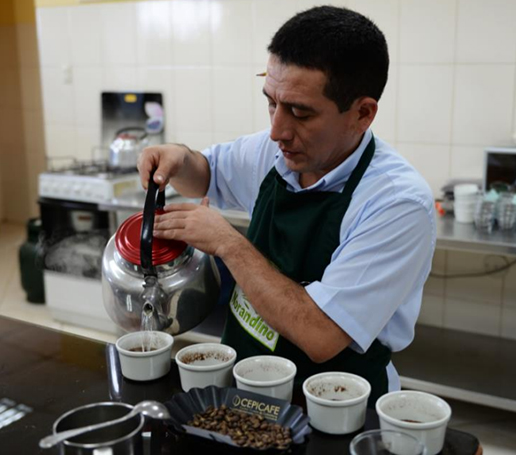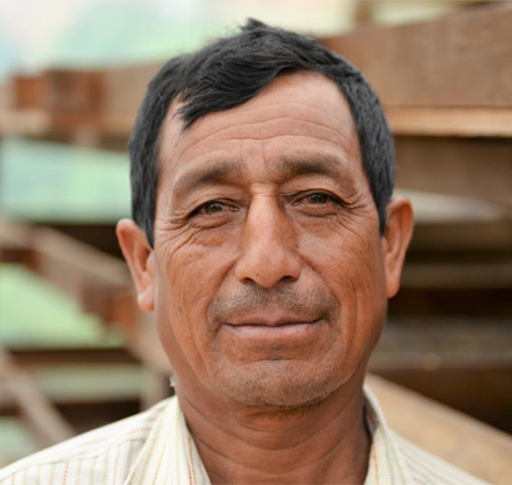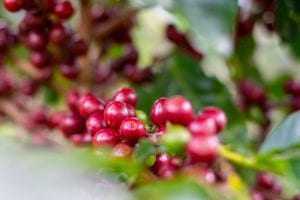The Effects of Climate Change on Coffee Producers
November 3rd, 2021 | Sourcing & Sustainability
With COP26 well underway, we’re highlighting some of the challenges our producers are having as a result of climate change and the measures taken to reduce its effects.
We spoke to some of our coffee producers to get their thoughts. Find the interviews in full below.
| COCAFCAL, Honduras | Sol & Café, Peru | Anserma, Colombia |
COCAFCAL, Honduras
Omar Rodriguez
What effects has climate change had on your farm?
“We’ve seen an increase in temperature and drought, acceleration and variation in coffee bean ripening, increased incidences of pests and disease in coffee, as well as low production.”
What are you doing about climate change? Do you have tools/training available to better understand and minimise the impact of climate change?
“A training plan has been developed with a focus on climate change, taught by experts and our Certifications team. We’ve also been carrying out activities on climate resilience, raising awareness on environmental occupational health and safety risk management, alongside reforestation, protection and conservation of water sources.”

What are your concerns for the future of your farms in relation to climate change?
“We’re concerned that we don’t have favourable climatic conditions for the production of the coffee crop, including a shortage of water resources. There could also be an increase in costs for crop management.”
Has the way you work to reduce the effects of climate change changed? If so, what are you doing?
“Yes, we have made several changes, which are:
• Use of the by-products of productive activity (coffee husk)
• Management of honey waters (after fermenting) in their final disposal
• Reuse and recycling of water for the coffee beneficiary (mill)
• Energy efficiency through the installation of solar panels in an administrative building
• Production of solid and liquid organic fertilizers, for crop management
• Soil conservation
• Sowing at a level curve with live barriers
• Crop diversification
• Distancing and planting density”

COCAFCAL is Fairtrade and Rainforest Alliance certified; have these standards helped you adapt to climate change?
“Yes, through:
• Planting of different species of plants
• Protection and conservation of ecosystems
• Protection and conservation of flora and fauna
• Increase of the fertile layer of the soil”

Do you think both younger and older farmers are equally aware of the effects of climate change?
“There is greater awareness in adults than in young people, however, through the activities and trainings that COCAFCAL is carrying out, they are focused on creating knowledge and awareness about the adverse effects of climate change.”
Sol & Café, Peru
What effects has climate change had on your farm?
“In 2012, we saw an increase in yellow coffee rust. Our partners had implemented tissue rehabilitation and nutrition practices in crops since 2012, so they were not affected. It affected producers in areas above 1700 meters above sea level.
“In 2016, there were long periods of drought in the months of September to December, greatly affected by producers in areas below 1300 meters above sea level. This also facilitates the proliferation of pests.
“The increase in the average environmental temperature is generating changes, which lead producers to start looking for areas to cultivate in the highest, most mountainous areas and lead to deforestation for the installation of coffee plots. We also experience long periods of drought or intense rains, compared to previous years. Previously, it was more balanced and allowed a normal development of the crop.”
What are you doing about climate change? Do you have tools/training available to better understand and minimise the impact of climate change?
“Yes, we have changed the approach of training and technical assistance services. We are beginning to understand the indicators and productive variables from environmental sensitivity and the adaptive capacity. Using that information, we can begin to design the services and accompany the partners in their investments to improve their adaptive and productive capacity in their production units.
“We have begun to improve the post-harvest processes with producers so that they improve their quality levels and break the belief that in low-lying areas one can not get a coffee above 84 or 85 points in a cup. The treatment practices of harvest residues such as coffee pulp have been improved. Honey waters, for the use of Bio ferments, microorganisms that contribute to produce organic and liquid fertilizers and are used in their production.
“Approx. 100% of our partner families have improved stoves in their homes to reduce the use of firewood, and prepare their food in better conditions.”
 |
 |
What are your concerns for the future of your farms in relation to climate change?
“The concerns are the frequency of rain and the existence of long periods of drought that greatly affect the production areas that are below 1,200 meters above sea level, or the existence of very intense rain that can affect the production areas above 1700 meters above sea level.”
Has the way you work to reduce the effects of climate change changed? If so, what are you doing?
“Yes, we manage the indicators, variables and the approach of the extension service. From there, we have accelerated the implementation of agroforestry systems to mitigate the damages due to long droughts in the farms of the partners. The gradual implementation of irrigation systems in the plots in the low areas, the productive diversification with the cultivation of cocoa, vegetable production, breeding of minor animals to be marketed in the local market mainly.
Sol & Café is Fairtrade and Rainforest Alliance certified; have these standards helped you adapt to climate change?
“Yes, they are aware, especially because they carry out a low rain fed agriculture. Since coffee is grown in the mountains, they are always very exposed and it is a practice that they teach us to understand from a very young age. In addition, through the technical area we, prepare them to adopt technologies that allow them to improve their production units and improve their response capacity to any climate change.”
Do you think both younger and older farmers are equally aware of the effects of climate change?
“There is greater awareness in adults than in young people, however, through the activities and trainings that COCAFCAL is carrying out, they are focused on creating knowledge and awareness about the adverse effects of climate change.”
Anserma, Colombia
What effects has climate change had on your farm?
“Climate change has changed the rainy seasons, moving the crops, and making it difficult to predict how the harvest will be. Also, it has increased the intensity of the droughts (niño phenomenon) and rains (niña). In 2019 there was a very intense niño that had a good impact on quantity, but damaged the grains, lowering the quality of the harvest. Prices were very low at the time, and because of quality damages, they were even 15% or so, lower.
“In 2020 and 2021 there has been a niña that brought a lot of rain that made an impact on the quantity. In Anserma, this year there will be 40% less purchases to the members than 2019.
“Also, ten years ago farms at a height from 1,100 to 1,200 mt above sea level were very productive for coffee, but now are low for the temperatures they usually have. So coffee has to go higher on the mountains.”
What are you doing about climate change? Do you have tools/training available to better understand and minimise the impact of climate change?
“We have programs to reforest the farms and we are trying to put coffee trees in the shade to protect for droughts, and to preserve humidity on the soil. This program also works for gender equality, because trees are planted by groups of women.
“We have a program “todos al Agua” that looks to preserve the water and tries to promote the resilience on climate change on five villages in Anserma.
“We also have a program with ecological kitchens, that uses less wood, trying to reduce the quantity of wood used (avoiding deforestation).”
Some videos on this work can be found here.

What are your concerns for the future of your farms in relation to climate change?
“Climate change is pushing the level where coffee can be grown and also we have avocados that are cultivated around 1600m above sea level, meaning we have less area to grow coffee.”
Has the way you work to reduce the effects of climate change changed? If so, what are you doing?
“In our area people started to grow plantain interspersed with coffee in order to bring some shade to coffee. Also people have started to plant trees again.
“A long time ago coffee was planted more in the shade, but with low prices coffee growers looked to increase productivity by having trees at full solar exposition. But that worked some years, but now with the temperatures rising it is a problem.”
If you are certified (Fairtrade/Rainforest Alliance), have these standards helped you adapt to climate change?
“Fairtrade premium of 20 cents is invested in some of the farms to make the infrastructure to preserve water, and also to make the reforestation programs.”
Do you think both younger and older farmers are equally aware of the effects of climate change?
“I think age does not make a difference. Older farmers might be more aware in the fact that they know how things were 15 to 20 years ago. They see how areas that were great for coffee, are not good anymore. Young might be because they are more open minded and maybe more informed (or misinformed?) by social media.”
For more information…
Anserma post regularly on their YouTube channel, so please take a look. Below is a list of videos showcasing the work they are doing to minimise the impact of climate change.
Todos Al agua
https://www.youtube.com/watch?v=jYHTCRNCuts&t=13s
https://www.youtube.com/watch?v=nkep4H00HlU
https://www.youtube.com/watch?v=c6x0DHMOU3w
https://www.youtube.com/watch?v=I7oshFhdz7Q&t=170s
https://www.youtube.com/watch?v=FDSBZXj-GiU
https://www.youtube.com/watch?v=t44v2KPlORk&t=10s
Ecological stoves
https://www.youtube.com/watch?v=Mqh5_YTw7l8&t=11s
https://www.youtube.com/watch?v=c-mk9GoHKgo
Women program
https://www.youtube.com/watch?v=9wlIr_48Q_U&t=31s
https://www.youtube.com/watch?v=ld3jUcFNP8A&t=11s
https://www.youtube.com/watch?v=cNbLRbo-7zk&t=3s
